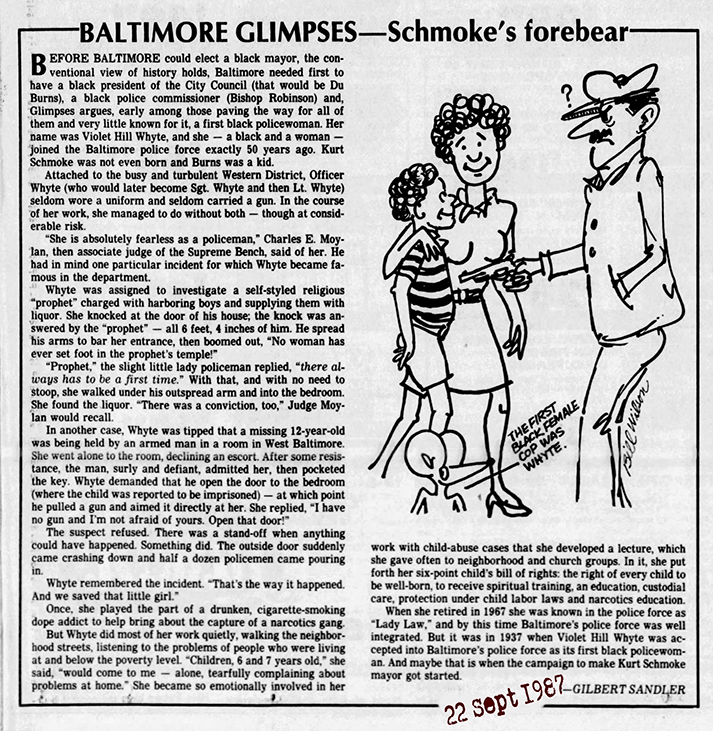Lt Violet Hill Whyte
The First African American Police Officer in the Baltimore Police Department was Officer, Violet Hill Whyte when she was hired on 3 Dec 1937. In an editorial, the Baltimore Sun said, "She worked in an all-white, mostly male-dominated institution, and won the respect of all those she worked with, she did it through hard work, and human understanding." The Sun report went on to say she explained her success by saying, "I'm not afraid of hard work." During her 30 years on the police force, she proved “hard work!” time and time again, she worked 16 to 20 hour days.
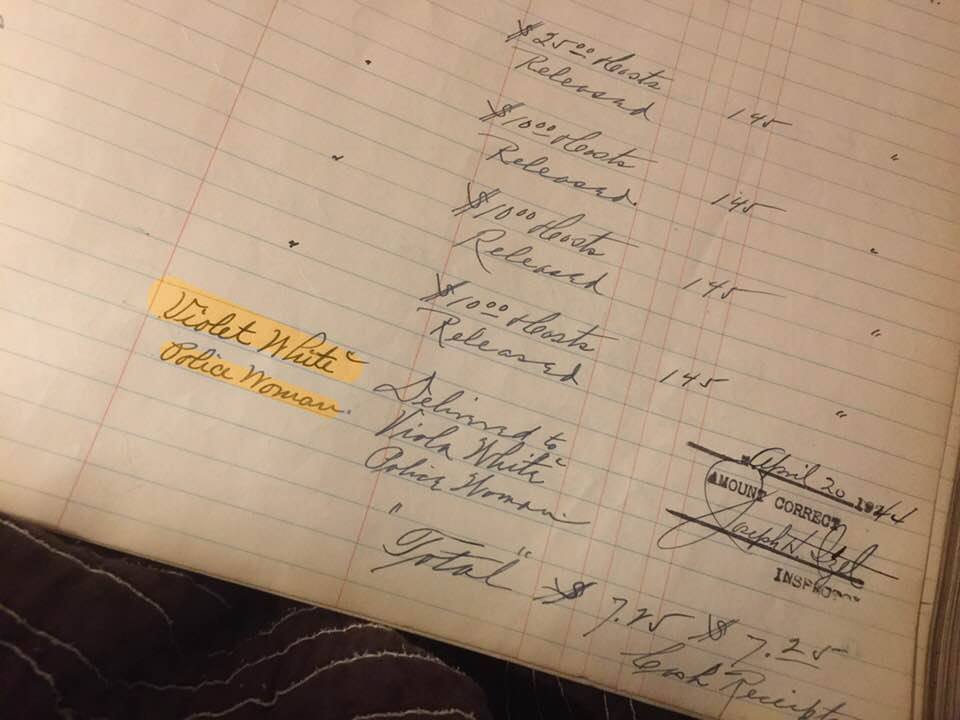
In this 1944 ledger, on April 20th someone signed a juvenile over to Mrs. Whyte's custody.
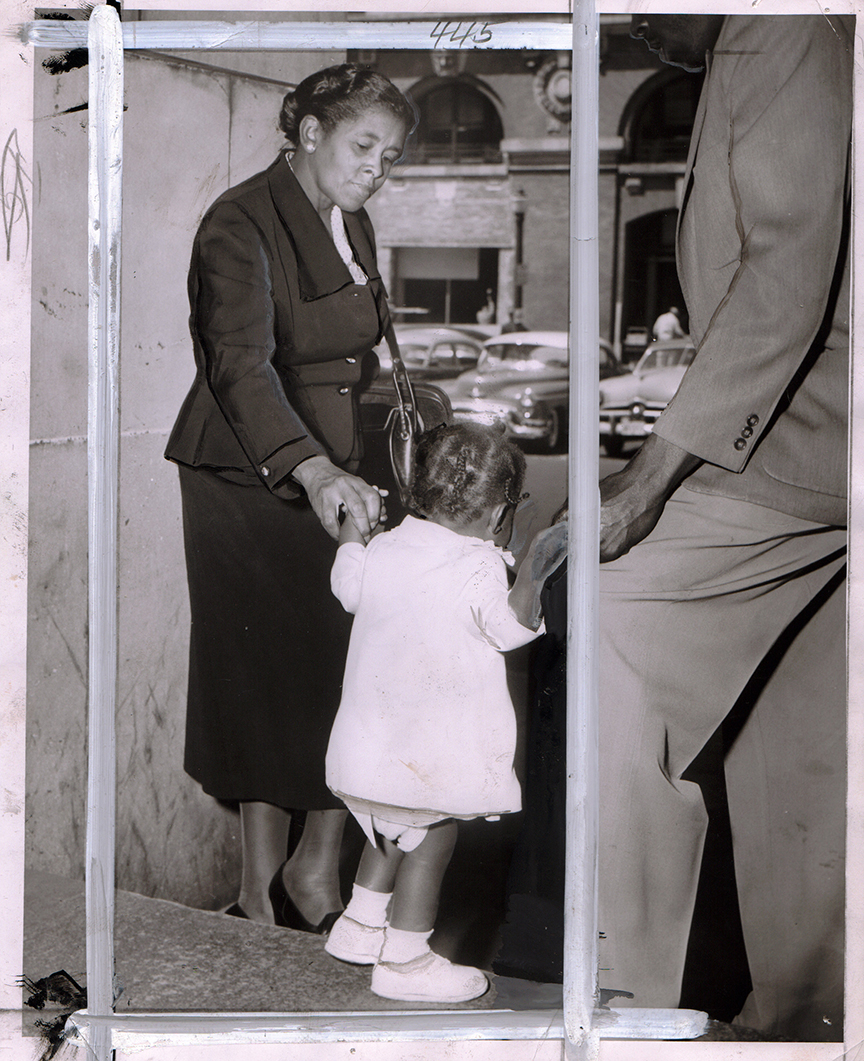
Lieutenant Violet Hill Whyte
The First African American Police Officer in the Baltimore Police Department was Officer, Violet Hill Whyte when she was hired on 3 Dec 1937. In an editorial, the Baltimore Sun said, "She worked in an all-white, mostly male-dominated institution, and won the respect of all those she worked with, she did it through hard work, and human understanding." The Sun report went on to say she explained her success by saying, "I'm not afraid of hard work." During her 30 years on the police force, she proved “hard work!” time and time again, she worked 16 to 20 hour days. Often she would begin her shift at 6 a.m. and not leave until midnight or 1 a.m. only to go home and go back to the station by 6 a.m. She worked cases, as well as collecting clothing for inmates, and the poor. She made holiday baskets for the needy and counseled delinquent kids and their families. She once said, "Being first at anything is hard because you represent so many others; if you do poorly, everyone will think all those you represent will also do poorly." I understand what she means, and how that can be hard, If I were voting for someone to become, County Council, and I heard one of the guys running was Irish, and a Retired Baltimore Police Officer, some might think he would automatically have my vote, but actually, I would want to make sure that if his nationality and former employment was a factor; before he got my vote, I knew he would represent us well, and that is Lieutenant Whyte was saying, if she had done poorly, it would reflect on all of her sex and all of her race and would have people saying, we must all be like that; so if we are all going to be judged on the acts, or conduct of one, then let us send the best we have. Let's not send the first that asked to go. Mrs. Whyte went in alone, she was notably the first African American Police Officer, and she represented well; 30 years, not one day missed; 30 years, she did more than she was asked, she worked doubles and more. She was an example not just for Women and African American Police, but for all police, it is sad that she is only remembered for being the first African American Officer on the Baltimore Police Department because she was so much more. Lieutenant Whyte was a good police officer, she was a hard-working police officer, a caring police officer… and she should be known for that… more than the color of her skin.
Sadly Lieutenant Violet Hill Whyte passed away on 17 July 1980 while in the Keswick nursing home where she had been since November 1979. - God bless her and thank her for her service. There is no use in being first if you can’t also be the best, and she was said to have been the best by any standard.
What Follows are the Many Articles that Tell the Story if Mrs. Lieutenant Whyte First let's take a look at this Newspaper Article dated 3 July 1920, with a headline of - "No Negro Policemen, and General Gaither's Dictum"
![]()
Newspaper - 3 July 1920 - No Negro Policemen, General Gaither’s Dictum.
Subtitled; Announces none will be appointed, even if they pass the examination -
Declares time is not right - Representative of Colored Race Informed of Decision,
Can Maintain Order without them, Commissioner Rules.
Police Commissioner Charles D. Gaither has decided that Negroes although they take the examination, will not be appointed to the police force. General Gaither declared yesterday (2 July 1920) that "The psychological time had not come in Baltimore for the appointment of Negroes to the force." The Negro population was informed of General Gaither's stand through a Negro newspaper. Carl Murphy, the colored editor of the paper, called on General Gaither Tuesday and asked for the General's, "position on the subject of appointing colored men to the force providing they are successful in passing the examination, and their names were entered on the eligible list." The General told Murphy the time has not come for such action and that he positively would not appoint a colored man as a member of the Department. Murphy pointed out that New York City with the force of nearly 11,000 policemen at 8 Negro policeman. General Gaither replied that if the same percentage were applied to the local Department Baltimore would have no Negro policemen. There is no doubt, said General Gaither, "That colored policeman could be of value to the Department under certain conditions, but Baltimore does not need Negro policeman at this time. Our officers and patrolman have for many years maintained law and order in Negro neighborhoods and we propose to do so in the future. As far as I am concerned the question of appointment of Negroes to the police force is settled." Colored men interested in having negroes appointed to the force made an appeal to the former police board headed by General Lawrason Riggs. At that time information was submitted showing that the following cities had negro policemen, Pittsburgh 65 Trenton 2, Philadelphia 300 Cincinnati 9, Chicago 95, New York 8, Los Angeles 18, Cleveland 15, Detroit 14, Indianapolis 13 Boston 25. Figures were also submitted showing the cities which did not employ colored policemen. The large southern cities not having negro policeman were New Orleans and Atlanta. General Riggs told the negro delegation then that he did not think the time had come for the appointment of negroes to the force.
There were similar articles written in the Baltimore Sun 1909, Titled "Woman Cops?-- OH, My!" Subtitled "Police Officials Discuss Rev. Anna H. Shaw's Plan". it goes on to say, "Best Beat For a Woman, Takes Her All Over Her House", as they were rejecting the hiring of women on the force in 1909. In June, and July of 1912, Ms. Mary S. Harvey, and Margaret B. Eagleston became the first women hired by the Baltimore Police Department. So while there were issues over hiring Womens, and over hiring African American Officers, it may come as a surprise that first African American Officer hired was a woman. General Gaither was Baltimore’s Police Commissioner from 1920 until 1937, on 4 December 1937, after Gaither's exit from the Baltimore Police Department, Mrs. Violet Whyte would become Baltimore Police Department's first Africa American Officer. She would eventually become assigned to the Northwest District, where she worked for 30 years, sometimes working 16 and even 20 hours a day. In 1955 she was promoted to the rank of Sergeant, and in 1967 several months before retirement, Sgt. Whyte was promoted to Lieutenant. She retired on 7 December 1967 but continued working for anywhere from several weeks, to several months depending on who you talk to, or what you read... But one thing they all say, she was a hard worker, she was determined and she had to finish a project or several projects that she had started.
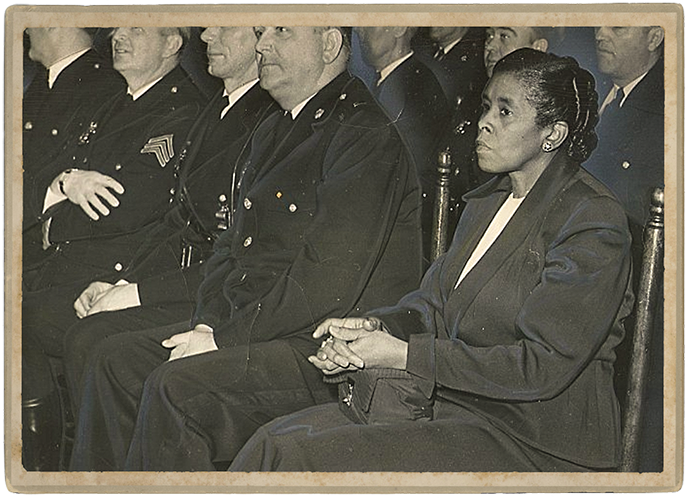 African Americans in the Department
African Americans in the Department
More on Lieutenant Violet Whyte, by way of several Sun paper reports
POLICE WORK BEGUN BY COLORED WOMAN
Mrs. Whyte became the first Negro Member of Force, Assigned To Northwestern this information coming from a newspaper dated 4 Dec 1937 telling of Ms. Whyte's appointment her being appointed a day earlier on 3 Dec 1937. This was nearly 10 years before baseball's Jackie Robinson would hit the fields for the Brooklyn Dodgers on 15 April 1947 and 17 years before the Baltimore Orioles would hire pitcher Jehosie "Jay Heard on 24 April 1954.So while our Police department seemed behind in the times, they were really ahead of the times and would have been much quicker had it not been for Commissioner Charles D. Gaither. Once he was out of the way Commissioner William Lawson stepped up and hired Mrs. Whyte, allowing her to go on to do outstanding work for the Baltimore Police Department and the community she served.
Qualifications For Post Are Cited By Commissioner Lawson
Mrs. Violet Whyte, Baltimore's first colored member of the Police Department, last night [3 Dec 1937] took over her duties as a policewoman, assigned for the moment to the Northwestern district. William P. Lawson, Commissioner of Police, in a statement outlining her qualifications for the post, said last night that after her work in Northwestern was finished she would be available for duty elsewhere in the city.
Appointee Lauded
Policewoman Whyte is "one of the best-prepared women among the colored people of Baltimore for the work she is to do," Commissioner Lawson said. He mentioned that she is the daughter of the late Rev. Daniel G. Hill, for many years pastor of Bethel AME (African Methodist Episcopal) Church. Lanvale Street and Druid Hill Avenue, and that among her brothers and sisters are a Vice-President of Howard University and an instructor at Lincoln University, an instructor at Princess Anne Academy, and another instructor in Southern College. Policewoman Whyte is 40, married and the mother of four children Her husband George Whyte, has been a principal in the public schools of Baltimore for the last ten years, she lives at 623 North Carrollton Avenue.
Various Posts Named
Among the posts she has held or now holds, which fit her for her job, Commissioner Lawson named the following: Teacher in the School of Christian Education. Member, advisory board, Civic League. President, Intercity Child Study Association, Teacher, Department of Parent Education. Executive secretary, Parent-Teacher Federation, Policewoman Whyte is an active member of the Negro State Republican League.
![]()
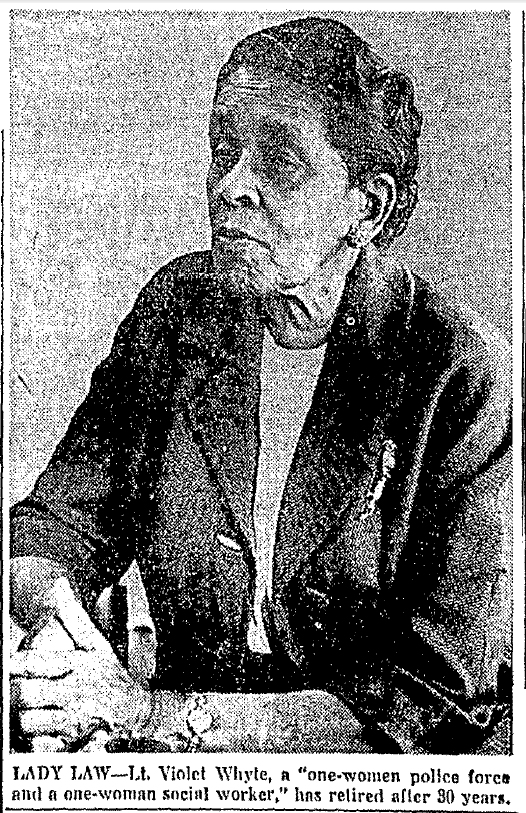 “Lady Law” Leaves The Force After 30 Years
“Lady Law” Leaves The Force After 30 Years
But Only Formally: as Volunteer She Still Helps All
7 December 1967
“Lady Law” as Lieutenant Violet Hill Whyte is known to hundreds of persons in West Baltimore, has formally retired from the Baltimore Police Department. But Lieutenant Whyte, the soft-spoken slender woman who made headlines as the first and Negro policewoman to join the force 30 years ago, (7 Dec 1967) still comes to her office at 6:00 A.M.) every morning. She organized the distribution of Thanksgiving baskets to needy families throughout the city and is now planning a Christmas party for 4000 children at the Royal Theater on Pennsylvania Avenue.
Holiday Project Goes
She councils as many as 125 persons a month who come from the city and county to see her and in addition, works a regular 8 hours a day as a member of the Western District force. Although she officially retired December 3, Lieutenant Whyte will continue those, and other activities on a volunteer base until the end of her “Holiday” projects. So she continues to collect Christmas toys in laundry baskets in the police station and to gather clothes for prisoners and their families. She is so awakened at all hours of the night by those who want, her help, or sometimes they call about the “Good News” she said, referring to a woman who phoned at 1:30 A.M. because she was, “so glad” about the birth of her first grandson. She would be described by retired Judge Charles E. Moylan Sr. of the supreme bench of Baltimore as a “one-woman-police-force, and a one-woman-social-worker combined” she has worked narcotics cases, homicides, assaults, sexual abuse, and robberies during her 30-year career.
She is Known for Bravery
Once she played the part of a “drunkard, cigarette smoking, dope addict” to help bring about the capture of a narcotics gang. For that, she received a Federal citation and was invited to appear before the Keauver committee investigating criminal rackets. Lieutenant Whyte, rarely carried a gun, in one incident she declined an escort as she went to help a 12 year-old-girl being held by an armed man. She said she enjoys testifying in court, and disliked child abuse cases more than any other assignments I Get Emotionally Involved “It’s with the children that I find I get emotionally involved,” she said “Emergencies always seem to happen before 6:00 AM” she said, adding she never needed a sleeping pill to go back to sleep when she was awakened, and never missed a day at work on account of illness, or otherwise. Lieutenant Whyte, the only Female Lieutenant of the 46 women on the police force, she was born in Washington and came to Baltimore as a young girl. Her father the Rev. Daniel G. Hill was a Methodist Minister (Bethel AME), and her mother a teacher.
Has Five Children
She graduated from Douglass High School and Coppin State College. She was married to a public school teacher, who went on to become a principal himself, and who is now dead. She has five grown children. “Retirement from one’s job doesn’t mean actual retirement,” she said. She is spoken in every State in the country and expects to continue her speaking career. She is also thinking of taking a job in the community service field. But after 30 years of work on countless crimes, and a lifetime of participating in church, and civic activities, she has one more wish – Time to grow flowers at her house on Elsinore Avenue. A testimonial fete will be held at 7:30 P.M. today in her honor at the Blue Crest North
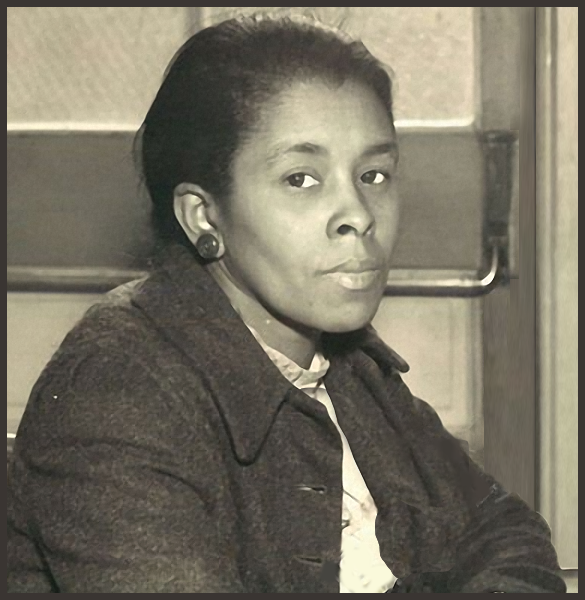 Whyte, Black Police Pioneer, Dies
Whyte, Black Police Pioneer, Dies
22 July 1980
Lieutenant Violet Whyte who in 1937 became the first black officer to be appointed to the city’s police force always said “I’m not afraid of work” The lieutenant who died last Thursday at the age of 82 proved during her 30 years on the police force, she meant what she said. Lieutenant Whyte often worked as many as 16 hours a day collecting clothing to the inmates and Thanksgiving baskets for the needy, and counseling to like what youngsters and their families in addition to handling cases that ranged from homicide to child abuse. The late juvenile court Judge Charles E Moylan Sr. once called her a, “One-Woman-Police-Force and One-Woman-Social-Worker Combined!” Known as, “Lady Law” to her coworkers, the former police Lieutenant, and social activists never carried a gun. Born in Washington, she was the daughter of the Methodist minister, “My father taught me young, not to fear death, nothing has helped me as much in police work!” she said once, after helping the capture a narcotic gang, and impersonating a drunken, cigar smoking, dope addict on one of the most of the chilling of winter nights! For this action, she was invited to appear before, The Kefauver committee, which was investigating organized crime in 1952. She moved to Baltimore as a child and was a graduate of Douglass a senior high school, and Coppin State Teachers College. For about six years, she taught grammar school in Frederick County, then marrying the late George Sumner Whyte, a city school principal she stopped teaching, and raised four children. Two of them were adopted. In 1937 she became the first black police officer in the city of Baltimore and was assigned to the Northwestern District. In 1955 she was promoted to the rank of sergeant, she was in charge of the policewomen, and transferred to the newly opened Western District Because of the uniqueness of her occupation at the time she was asked to appear on The TV game show “To Tell the Truth” in 1962 and channel thirteen’s “The Brent Gunts show”. In October 1967 just two months before retirement she was promoted to the rank of Lieutenant. She once told a reporter that of all the cases she ever worked to dislike child abuse of the most “It’s with the children that I find I get emotionally involved,” she said After retiring from the police force in December of 1967, she became a fieldwork supervisor for Planned Parenthood of Maryland and “continued visiting inmates and nursing homes with her sunshine bag of gifts and toiletries,” her daughter, Esther C Bailey, said yesterday “I belonged to everything in Baltimore!” Lieutenant Whyte one said when questioned about her numerous affiliations. She was appointed by both governors McKeldin, and Tawes to the board of managers of Boise and village in a Cheltenham. She was also on the Board of Directors of Provident hospital a board member for the former Maryland safety council, a member of the speakers’ bureau of the women’s Christian temperance union, a member of the Lambda Kappa Mu sorority, the Charmettes, a social group. The Phi Beta Sigma Wives, the F.E.W. Harper Elks Lodge No 429 and the Matinee Ensemble, a civic association The in addition to her daughter in Baltimore she is survived by two other daughters grace and Daniel of war Simpson and Grace Virginia of Waynesboro Pennsylvania, a sundial rustle of Eden Maryland three sisters Esther hill Isaiah and grace hill Jake up and Lea hill Fletcher all of Petersburg a Brother Joseph N hill of New York City and five grandchildren. Services for the lieutenant will be held at noon today at Bethel AME church 1300 sold 110. The family suggests that expressions of sympathy be in the form of memorial contributions to the acute stroke unit care of Dr. Elijah Sanders, provident hospital, 2600 Liberty Heights Avenue. 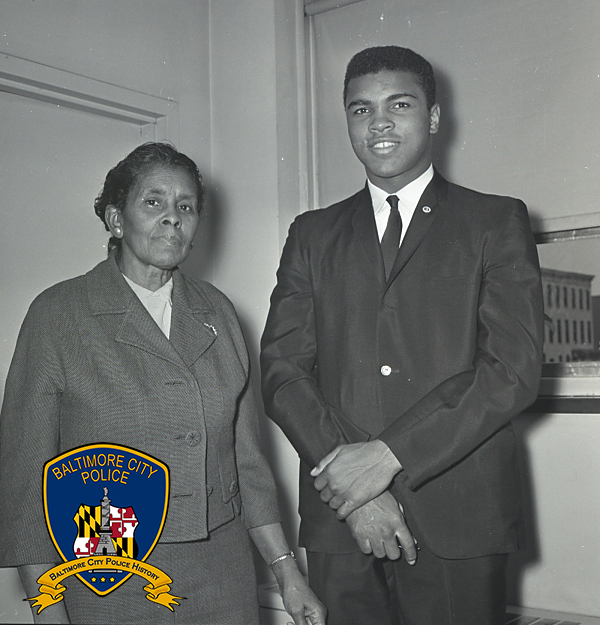
Violet Hill Whyte with Mohammad Ali
![]()
Sun Paper article circa 1987
To see full size article click HERE or the above article
Violet Hill Whyte (November 18, 1897 – 1980, born Violet Hill) was a teacher, the first black officer to be appointed to the Baltimore Police Department in Maryland, and a community activist.[1] She was appointed in December 1937 by Commissioner William P. Lawson, and served for 30 years, reaching the rank of lieutenant. In addition, she participated on numerous community boards and commissions, working to improve the lives of women and children especially in Baltimore.
![]() Biography
Biography
Violet Hill was born in Washington D.C. on November 18, 1897. Her parents were Daniel G. Hill and Margaret Peck Hill, and she had nine younger siblings. Among her brothers was Daniel G. Hill II. His son Daniel G. Hill III became a prominent sociologist and activist in Ontario, Canada. Her father was university educated and an ordained minister of the African Methodist Episcopal Church, the first independent black denomination in the United States. Her brother Daniel also graduated from college and became an AME minister, serving in Missouri and the West. Violet Hill graduated from Douglass High School and Coppin State College.
She married George Sumner Whyte and they had four children together. She worked as a public school teacher for nearly two decades in Baltimore, Maryland, before becoming a police officer.
Whyte became interested in working as a police officer. She completed the training program and was appointed in 1937 as the first black officer in the Baltimore Police Department. (Atlanta, Georgia by contrast, did not appoint any black officers to its police department until 1948.) Whyte served for 30 years before retiring, reaching the rank of lieutenant. She died in 1980.
![]() Career as police officer
Career as police officer
"I'm not afraid of hard work." - Violet Hill White
Whyte was appointed to the northwest district at Pennsylvania Avenue and Dolphin Street by Commissioner William Lawson. She was not given a gun. Her duties included patrolling the streets, homicide investigations, narcotics cases, assaults, cases of sexual abuse, and robberies. She was known to work undercover. Youth who lived in her district said later that she would often intervene when she saw students skipping school. Her efforts earned her the nickname "lady law." Juvenile Court Judge Charles E. Moylan Jr. described her as "a one-woman police force and a one-woman social worker combined". In 1955, she was promoted to sergeant and oversaw policewomen. She ended her career in the Western District. Before her retirement in 1967 after 30 years of service, she was promoted to lieutenant.
Over the course of her career, Whyte earned six commendations and numerous awards. She also served on the following Boards and Commissions: The Governor's Commission to Study Problems of Illegitimacy; cd Called to Testify on National Television on "Kefauver Congressional Committee on U. S. Narcotic Violations"; Secretary to the Board of Directors of Provident Hospital; Secretary to the Board of Managers of Boys' Village of Maryland; Member of the Speakers Bureau of the National Women's Christian Temperance Union; Governor's Commission - A Study "Juvenile Delinquency and Adult Penal Conditions"; Board Member - Maryland Safety Council; and Organizer and Chairperson - Holiday Institutional Committee.
Community work
In addition to her police work, Whyte was an active volunteer: She collected clothing for prison inmates and made holiday baskets for the needy. One year she planned a Christmas party for 4,000 children at the Royal Theatre. She also lectured in the community about child abuse. Her lecture included a six-point child's bill of rights.
After retiring, she continued to volunteer, working with Planned Parenthood as a field supervisor. She also worked with the Neighborhood Family Planning Center.
![]() Awards
Awards
1956 - In Recognition of her services to the city of Baltimore by F. E. W. Harper Temple No. 429 I. B. P. O. E. W.
1963 - Distinguished Citizen Award - Sophists Club Houston-Woods Junior High School
1963 - Sigma Wives - Congratulations for Service Rendered and Promotion to Sergeant
1964 - Certificate of Appreciation - Guest Speaker Reisterstown Junior Chamber of Commerce
1967 - Afro-American for "Superior Public Service Without Thought of Gain"
1968 - Democratic Ladies Guild - Community Achievement Award
1968 - Mayor Thomas J. D'Alesandro III - City of Baltimore - Outstanding Citizen Award - Thirty Years of Faithful, Exemplary Service to the City of Baltimore
1968 - Woman of Conscience Award - National Council of Women of the United States.
1971 - Baltimore Safety Council - School and Child Division - Vice President 1971 - 72, Humanitarian Services to Baltimore Community in Field of Drug Education and Safety
1971 - Frederick Douglass High School Hall of Fame
1971 - District Police Community Relations Council Award for Meritorious Service
1971 - Loyalty, Dedication, Courtesy, Hospitality and Sheer Joy of Knowing that You Passed Our Way .. Zeta-Sigma Chapter, Phi Beta Sigma Fraternity
1974 - Outreach Award - Imperial Court of Daughters of Isis P. H. A. - "In recognition of the strength you have exhibited and the hardships you have endured, in your crusade to elevate the status of Black Women"
1978 - Freedom House Inc. "In recognition of your outstanding contribution to the community through dedicated service demonstrating integrity and professional performance of police duties, meriting our trust and respect"
![]()
POLICE INFORMATION
Copies of: Your Baltimore Police Department Class Photo, Pictures of our Officers, Vehicles, Equipment, Newspaper Articles relating to our department and or officers, Old Departmental Newsletters, Lookouts, Wanted Posters, and or Brochures. Information on Deceased Officers and anything that may help Preserve the History and Proud Traditions of this agency. Please contact Retired Detective Kenny Driscoll.

NOTICE
How to Dispose of Old Police Items
Please contact Det. Ret. Kenny Driscoll if you have any pictures of you or your family members and wish them remembered here on this tribute site to Honor the fine men and women who have served with Honor and Distinction at the Baltimore Police Department. Anyone with information, photographs, memorabilia, or other "Baltimore City Police" items can contact Ret. Det. Kenny Driscoll at
Copyright © 2002 Baltimore City Police History - Ret Det Kenny Driscoll


